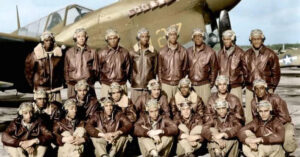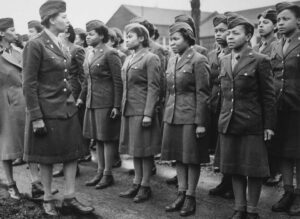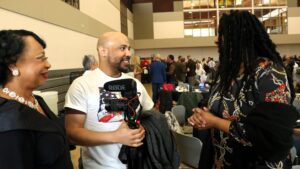![]()
While the United States military was racially segregated until President Harry S. Truman ordered its integration in 1948, Black military units have a long history of courageous service in Oregon that goes back much further.
Buffalo Soldiers
In 1899 the now-famous Buffalo Soldiers, and one of their regiments that was stationed at the Vancouver Barracks in Washington. The company of 103 soldiers from the U.S. Army’s 24th Infantry — one of four African American regiments known as Buffalo Soldiers — arrived at the barracks during a time when respect for Black soldiers was buoyed by their recent success in the Spanish-American War in Cuba.

While in the Northwest, the soldiers participated in military, political, and social activities, introducing many residents of Oregon, Washington, and Idaho to Blacks and raising local awareness of the national policies and practices that beleaguered African Americans.
The regular assignments of garrison duty at an army post — drilling, marching, and marksmanship; improving the post’s infrastructure; performing maintenance and clerical work; and attending the post school — comprised the majority of the soldiers’ duty hours at Vancouver Barracks.
A regional crisis with national implications, however, soon called them to arms. Violence had broken out in the Coeur d’Alene mining area in northern Idaho, and a mill owned by the Bunker Hill and Sullivan Mining Company had been dynamited. The federal government dispatched troops; and in May 1899 Company B, some of the closest soldiers to the area of conflict, responded to the scene.
Along with soldiers from other forts, they imposed martial law and guarded prisoners and rail lines in what was one of the major labor-capital conflicts of the twentieth century.
In contrast to the confrontational nature of their duty in Idaho, these soldiers interacted with the public differently in Portland and Vancouver, primarily through formal events and activities. Soldiers of Company B took part in ceremonies that previously had been the responsibility of white soldiers, including parades, escorts, military band concerts, and funerals.
In 1899, for example, Company B provided full military honors at the burial of Moses Williams, a retired Buffalo Soldier from the 9th Cavalry and a Medal of Honor recipient, who died on August 23. Williams, who had been the ordnance sergeant at Fort Stevens, near Astoria, was buried in the Vancouver Barracks post cemetery.

The soldiers of Company B made the most of their leisure time, organizing dances, parties, and baseball games. The Portland New Age, a Black-owned newspaper, reported on the soldiers’ involvement in social activities, including a wedding in Vancouver where “quite a number of friends from Portland attended.” The company’s baseball team, called the Hard Hitters in local newspapers, played several games, including some against white teams.
The growing African American community in Portland, centered on the neighborhood around Union Station, served as a hub of social life for the soldiers of Company B. The company’s ranking noncommissioned officer, Sgt. Mack Stanfield, and his wife, 35-year-old Sallie, later retired to Portland, where they remained for the rest of their lives.
Stanfield and a fellow Buffalo Soldier, Sgt. Alfred J. Franklin, jointly owned and operated the Luneta Saloon at 101 Park Avenue North, along the North Park Blocks near Union Station, and both owned homes on Portland’s east side. Mack and Sallie Stanfield are buried in Lincoln Memorial Park Cemetery in Portland.
Company B’s duty at Vancouver Barracks ended on May 17, 1900, when the soldiers departed for Fort Wright, near Spokane, Washington. Within months, on October 16, they had been transferred to the Presidio in San Francisco, then to duty in the Philippine Islands.
Portland Bunch
Another Black unit that was based in the Portland area for a time was the aptly nicknamed “Portland Bunch,” which was comprised of members of Company 21, 116th Depot Brigade, and assembled at Camp Lewis, Wash., in August 1918.

President Woodrow Wilson’s decision to declare war on Germany and enter World War I in April 1917 spurred one of the largest military mobilizations in the history of the United States. To ensure that the U.S. could recruit enough manpower for the fight, Congress passed the first Selective Service law on May 18, 1917.
Volunteers and draftees from all over the American West reported to Camp Lewis (now Fort Lewis), Washington where they trained and awaited assignment to an active military unit.
The draft included both Black and white Americans, though Black soldiers were primarily assigned to Services and Supply (SOS), a branch of the Army was used primarily for jobs such as construction, dock work, and other physical labor. It is estimated that of the approximately 400,000 Black soldiers who served in the war, about 380,000 were assigned to SOS units.
The “Portland Bunch” was among this group, assigned to perform administrative functions in support of other units. They were also among the nearly 1,100 Black soldiers who were at Camp Lewis in August 1918, awaiting orders. They were almost entirely volunteers: Figures from the Mobilization Division of the Provost Marshal General’s Office record that only 68 African Americans from Oregon were drafted during the war.
On Aug. 1, 1918, the Portland Bunch was honored at a banquet hosted by Portland Mayor C. A. Bigelow and the Rev. J.B. Isaacs of the Bethel African Methodist Episcopal church. The Rosebud Study Club, an African American women’s service group, assisted with the banquet. The Rosebud Study Club and other Portland groups and organizations also organized a parade in the Albina neighborhood to honor the departing recruits before they headed for Camp Lewis.
Their service would be mainly stateside, as the looming armistice and cessation of hostilities — formally signed on Nov. 11, 1918, marking the first Armistice Day, which would later become Veterans Day — would make overseas deployments unnecessary.
Views: 335


